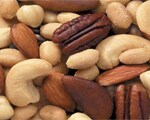Eating nuts reduces low-density lipoprotein (LDL) cholesterol and improves the blood lipids profile, suggests an analysis of 25 trials.

Nuts are a matrix of healthy nutrients, and the most obvious reason for the cholesterol-lowering effect is their unsaturated fat content. Nuts also contain fiber, vegetable protein, phytoesterols and other antioxidants. Studies have consistently associated nut consumption with reduced risk for coronary heart disease. Subsequently, many dietary intervention trials investigated the effects of nut consumption on blood lipid levels. To estimate the effects of nut consumption on blood lipid levels and to examine whether different factors modify the effects, researchers from California pooled data on 583 men and women who had participated in 25 nut consumption trials conducted in seven different countries. The participants had normal lipid profiles and were not taking any lipid-lowering medications when the trials started.
It was found that that eating about 2.3 ounces of nuts a day - a third of cupful - reduced total cholesterol levels by 5 percent and bad LDL cholesterol by 7.5 percent. That amount of nut eating also improved the ratio of LDL cholesterol to good HDL cholesterol by 8.5 percent and caused a decrease of 10 percent in triglyceride levels among people with high levels of those blood fats.
The benefits from eating nuts were found to be greatest among thin people, those with high LDL cholesterol and those consuming a fat-rich diet. Also, the type of nuts eaten didn't seem to matter. The benefits were same for walnuts, almonds, peanuts, pecans, hazelnuts, macadamias and pistachios.
Despite the protective effects of nuts, the researchers warned against over-consumption of nuts as they are highly caloric and thus can contribute to obesity. A 3-ounce-a-day limit was recommended.
DoctorNDTV is the one stop site for all your health needs providing the most credible health information, health news and tips with expert advice on healthy living, diet plans, informative videos etc. You can get the most relevant and accurate info you need about health problems like diabetes, cancer, pregnancy, HIV and AIDS, weight loss and many other lifestyle diseases. We have a panel of over 350 experts who help us develop content by giving their valuable inputs and bringing to us the latest in the world of healthcare.












